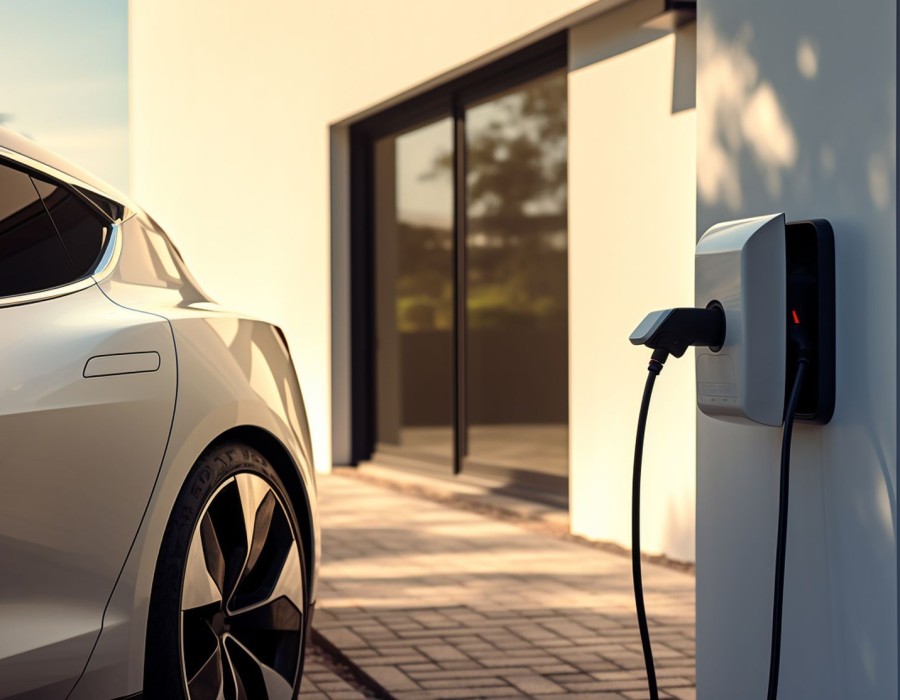If you've recently purchased an electric vehicle (EV) or are planning to, you're likely thinking about the best way to keep it charged. While a Level 1 charger that plugs into a standard 120-volt outlet is included with most EVs, it’s a slow solution, often taking more than 20 hours for a full charge. For most EV owners, a Level 2 charger is the most practical and efficient choice for home charging. It can significantly reduce charging time, often to just 4-8 hours, making it perfect for overnight charging.
But what exactly does Level 2 EV charger installation entail? It’s more than just plugging in a device; it's a home electrical project that requires careful planning and professional execution. Here's everything you need to know.
What is a Level 2 EV Charger?
A Level 2 charger uses a 240-volt circuit, similar to what you would use for a large appliance like an electric clothes dryer or oven. This higher voltage is what allows for a much faster charging speed compared to a Level 1 charger. Level 2 chargers are compatible with all modern EVs, though some Tesla owners may need an adapter for the universal J1772 connector.
The Installation Process: A Step-by-Step Guide
- Electrical Assessment: The first and most crucial step is to have a licensed electrician assess your home's electrical system. They will need to check your main electrical panel to ensure it has enough capacity and an available circuit breaker to handle the new load. If your panel is older or already at full capacity, you may need an electrical panel upgrade or the installation of a sub-panel. This step is non-negotiable for a safe and compliant installation.
- Choosing a Location: The electrician will help you determine the best location for the charger. This is typically in a garage or carport, but it can be installed outdoors as long as the unit is weather-rated. The ideal spot is close to where you park your car and the electrical panel to minimize the cost and complexity of the wiring run. A shorter distance means less labor and materials.
- Obtaining Permits: In most areas, a permit is required for a Level 2 EV charger installation. A professional electrician will handle the permit application and ensure the installation meets all local electrical codes. This is an important step that ensures the safety of the work and protects you from potential liability.
- Wiring and Installation: Once the permits are secured, the electrician will run a dedicated 240-volt circuit from your electrical panel to the charger's location. The charger itself can be either a hardwired unit or a plug-in unit that connects to a NEMA 14-50 outlet. While the latter is a simpler process once the outlet is installed, hardwiring provides a more robust and permanent solution.
- Final Inspection and Testing: After the installation is complete, a final inspection is often required by the local authority to verify that the work was done correctly and safely. The electrician will also test the charger to ensure it's functioning properly and providing a charge to your vehicle.
Why You Need a Professional for the Job
While a DIY approach might seem tempting to save money, it's highly discouraged. The high voltage involved in a Level 2 charger installation can be extremely dangerous. An improper installation could lead to electrocution, damage to your car's charging system, or even an electrical fire.
A licensed electrician will not only perform the installation safely but also provide a professional assessment of your home's electrical capacity. They have the expertise to identify potential issues you might miss and can ensure the work is done in compliance with all codes, which is crucial for safety and insurance purposes.
Cost and Other Considerations
The total cost of a level 2 EV charger installation can vary widely based on several factors, including:
- The charger itself: Prices for the units range from a few hundred to over a thousand dollars, depending on features.
- Labor costs: The complexity of the installation, particularly the distance between the panel and the charger, will affect labor hours.
- Electrical upgrades: If your panel needs to be upgraded, this will add a significant cost to the project.
- Permit fees: These vary by location.
Many governments and utility companies offer rebates or tax credits for EV charger installations, so be sure to research what incentives are available in your area to help offset the cost.
Investing in a professionally installed Level 2 charger is a smart move for any EV owner. It provides the convenience of fast charging at home and ensures that your electrical system can handle the increased load safely and efficiently for years to come.






Comments